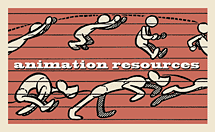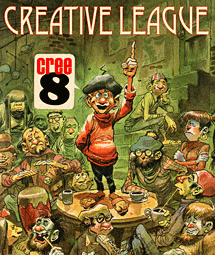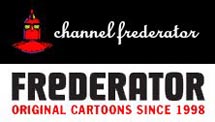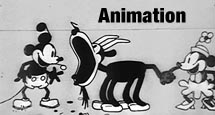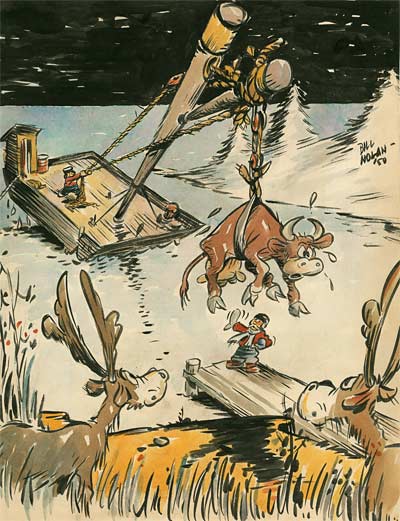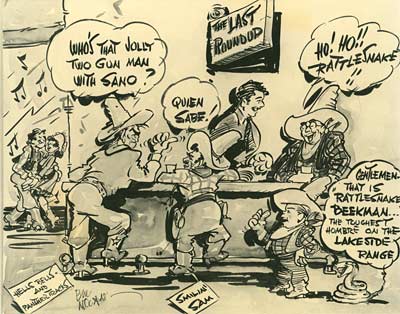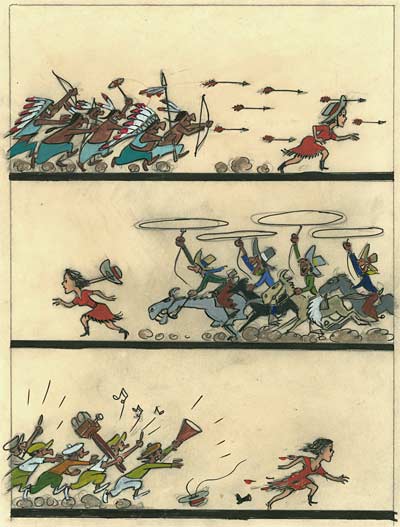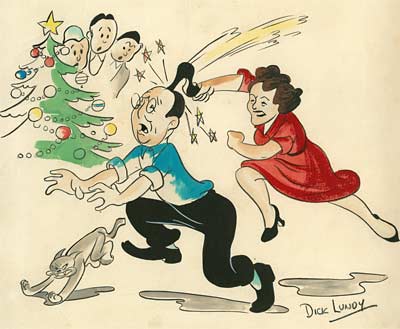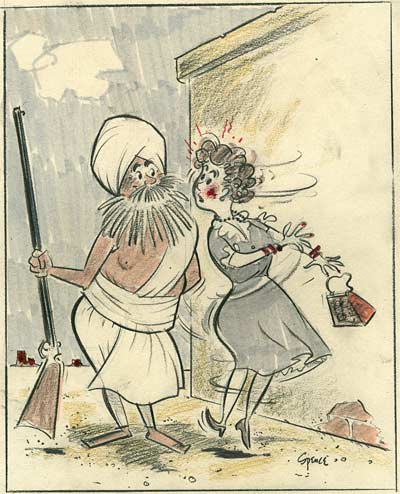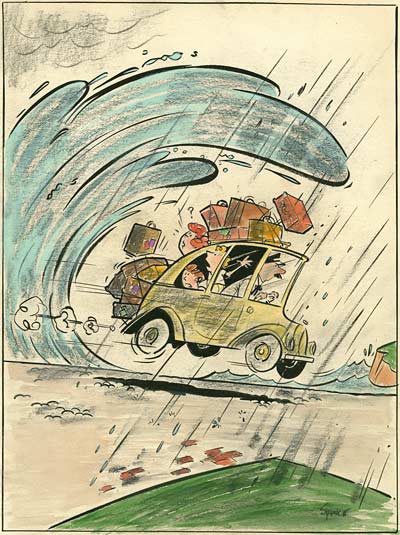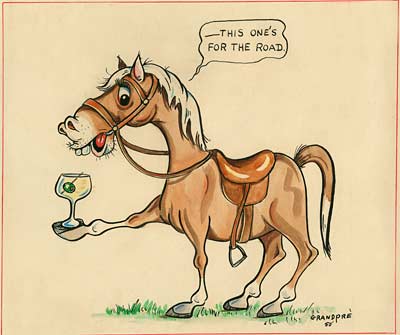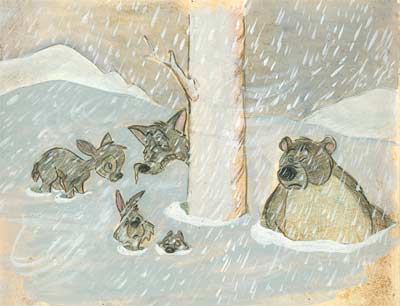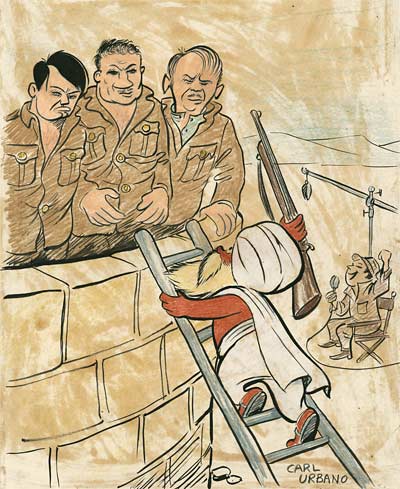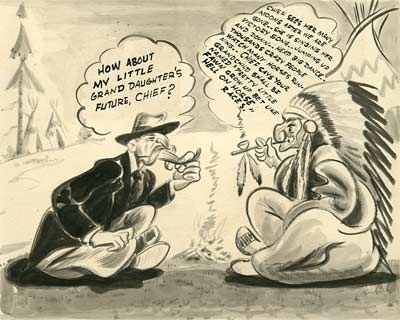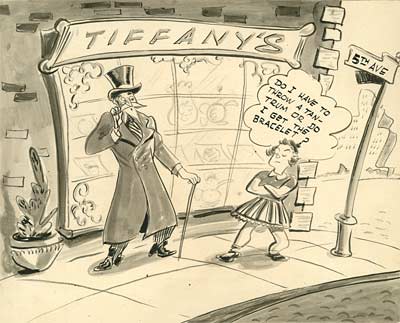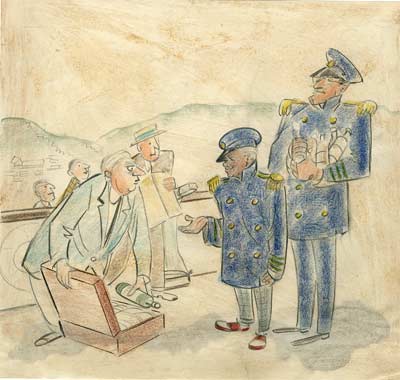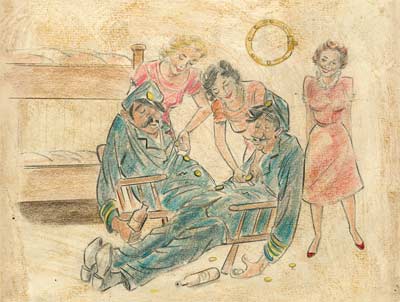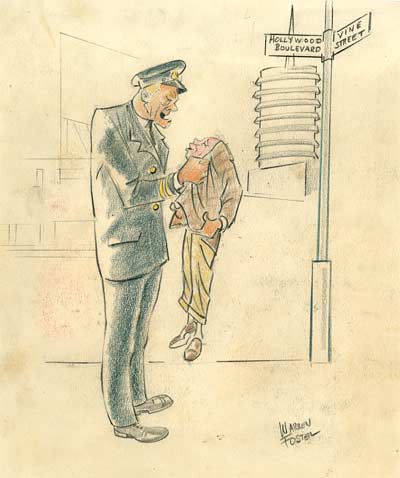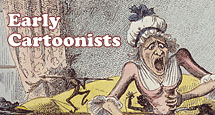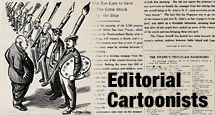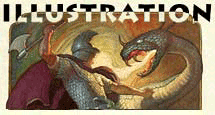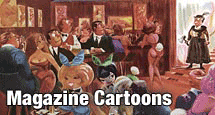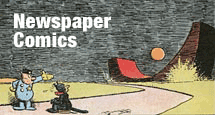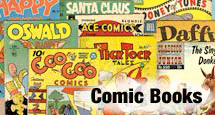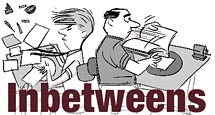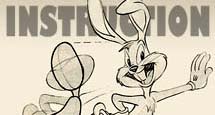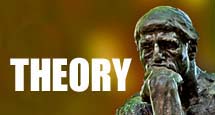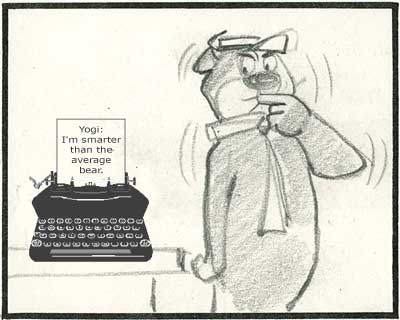
The other day, a discussion on cartoon writing erupted in response to recent posts on the subject in John Kricfalusi’s blog. One of John’s main points is that the golden age cartoons that we all regard as the greatest cartoons ever created were written by cartoonists as storyboards, not written in words as scripts. In support of his argument, he presented video clips of Walt Disney and Walter Lantz discussing the qualifications of the people who wrote their cartoons. (See also, Page 5 of the 1938 Disney Training Manual).

![]() The scriptwriters in the comments dismissed John K’s points as old fashioned and irrelevant to the current scene, while expressing respect of a general sort for the classic cartoons of the past. They claimed that it was just a matter of John’s personal tastes, not a reflection on the effectiveness of the process itself. They never seemed to address the fact that prior to 1960 stories for cartoons weren’t created and developed with words in script form- they were drawn. In listening to these arguments by current cartoon scriptwriters, I began to wonder how much they really knew about the process used to make the classic cartoons they expressed respect for. I posed a simple question…
The scriptwriters in the comments dismissed John K’s points as old fashioned and irrelevant to the current scene, while expressing respect of a general sort for the classic cartoons of the past. They claimed that it was just a matter of John’s personal tastes, not a reflection on the effectiveness of the process itself. They never seemed to address the fact that prior to 1960 stories for cartoons weren’t created and developed with words in script form- they were drawn. In listening to these arguments by current cartoon scriptwriters, I began to wonder how much they really knew about the process used to make the classic cartoons they expressed respect for. I posed a simple question…
Who was your favorite golden age cartoon writer?
It’s a fair question- one that I’ve heard animators discuss and argue about on many occasions. Surely current cartoon writers would have golden age writer heros, just like animators study golden age animators like Milt Kahl or Grim Natwick…
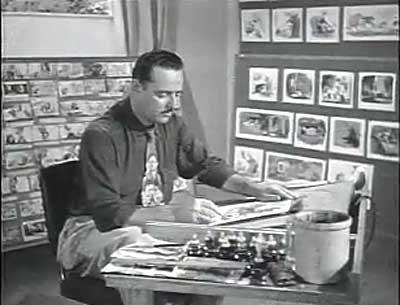
Disney story man, Joe Rinaldi
But none of the scriptwriters participating in the discussion could name a single golden age cartoon writer. The only names they could mention were other current scriptwriters, or novelists, journalists and live action screenwriters who worked in totally different media. They had no idea who pioneered their profession and the process these people used to create cartoons for nearly half a century. To be fair, this sort of ignorance of the history of our craft isn’t just limited to writers. I’ve heard the same sort of admissions of ignorance from producers and directors, as well as artists and animators.
Here is an example of a story by my favorite golden age story man… Warren Foster.
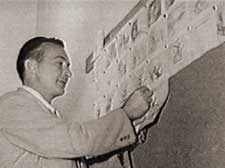
![]() Warren Foster is responsible for writing many of the greatest cartoons ever made… He started as a gag man on Fleischer’s Popeye series in New York, and moved West in 1938 to join Bob Clampett at Warner Bros. He wrote a string of classic cartoons… "Coal Black And De Sebben Dwarfs", "Birdy And The Beast", "Falling Hare", "Baby Bottleneck", "The Great Piggy Bank Robbery", and perhaps Bugs Bunny’s most shaded performance, "Tortoise Wins By A Hare".
Warren Foster is responsible for writing many of the greatest cartoons ever made… He started as a gag man on Fleischer’s Popeye series in New York, and moved West in 1938 to join Bob Clampett at Warner Bros. He wrote a string of classic cartoons… "Coal Black And De Sebben Dwarfs", "Birdy And The Beast", "Falling Hare", "Baby Bottleneck", "The Great Piggy Bank Robbery", and perhaps Bugs Bunny’s most shaded performance, "Tortoise Wins By A Hare".
After Clampett’s departure from the studio, he wrote for McKimson ("Gorilla My Dreams", "Easter Yeggs", "The Foghorn Legorn") and Freleng ("Ballot Box Bunny", "Bugs And Thugs", "Birds Anonymous"). Freleng said that Foster was the best story man he ever worked with. In the TV era, Foster wrote episodes of Huckleberry Hound, Yogi Bear, Quick Draw McGraw, The Jetsons and The Flintstones.
Here is a storyboard by Foster from his days at Hanna-Barbera. This is a model of clarity and simplicity, designed to meet the stringent economics imposed on TV animation at the time. This is a board from the pilot episode of The Yogi Bear Show.
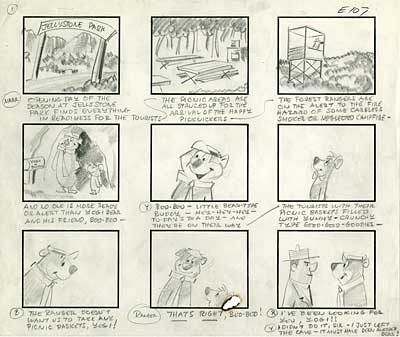
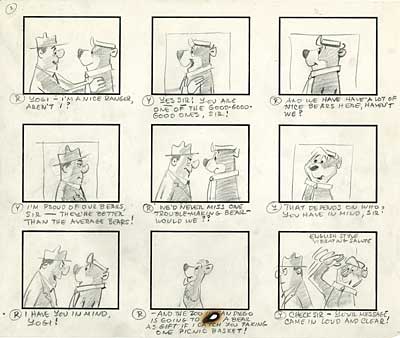
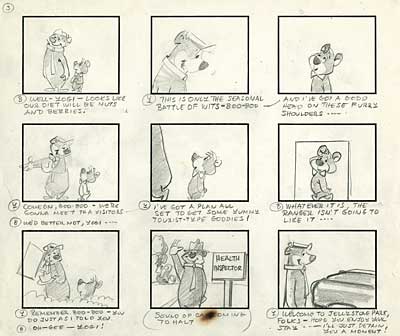
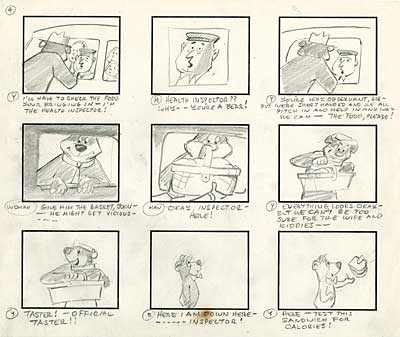
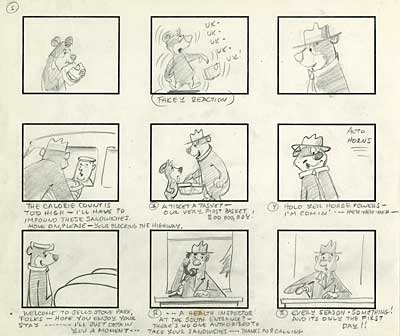
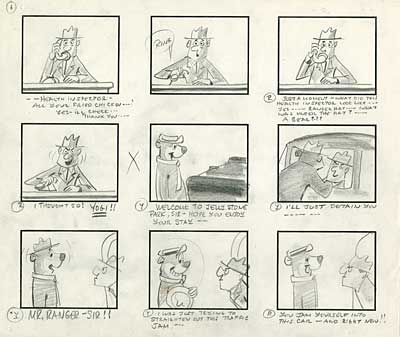
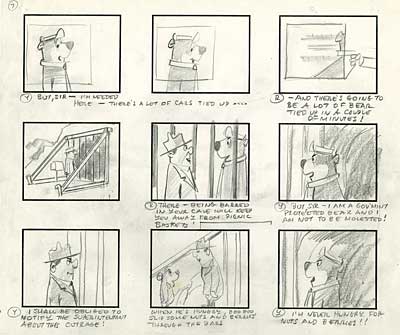
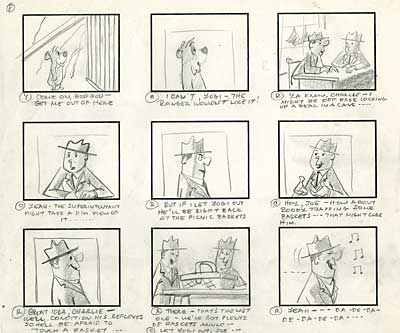
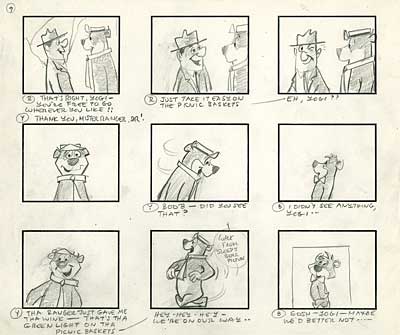
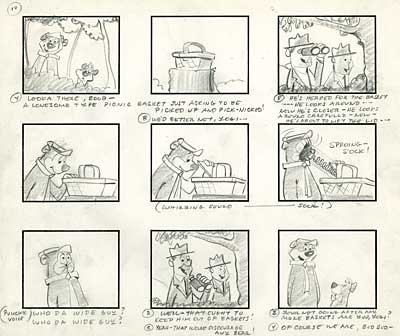
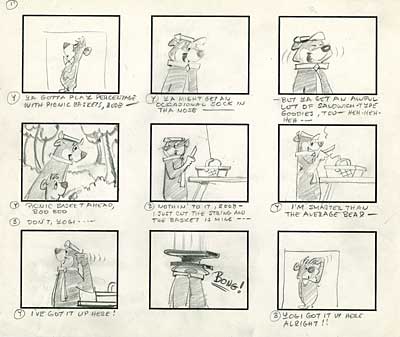
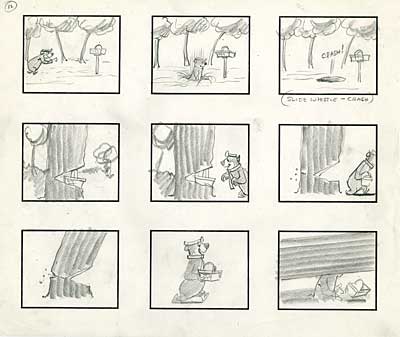
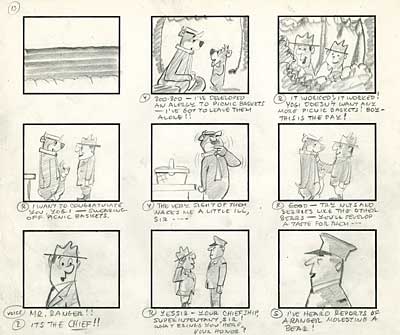
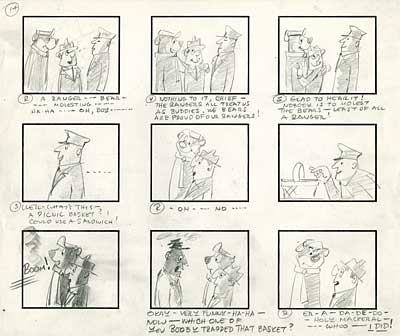
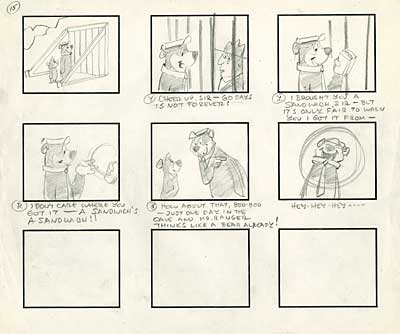
AND COMIC STRIPS?
In his article, "Detour Guide For An Armchair Marco Polo", master comic strip storyteller, Milton Caniff writes…
There has been a tendency recently for artists to automatically assume they cannot write their own stories because they see so many double by-lines. I contend that any man who can invent pictures can invent situations and dialogue. In fact, it should be easier for the artist to pilot his own action because he is not likely to write himself into one of those undrawable dilemmas in manuscripts about which illustrators have complained for years. –Milton Caniff
Sound familiar?
Stephen Worth
Director
Animation Resources
This posting is part of the online Encyclopedia of Cartooning under the subject heading, Animation.


